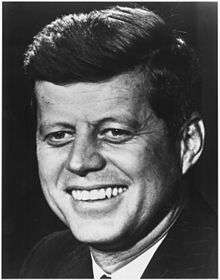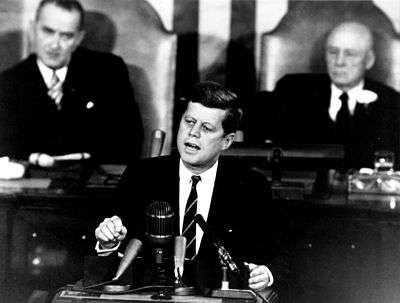1961 in the United States
| 1961 in the United States | |
|---|---|
| Years: | 1958 1959 1960 – 1961 – 1962 1963 1964 |
|
| |
 50 stars (1960–present) | |
|
Timeline of United States history
| |
Events from the year 1961 in the United States.
Incumbents
Federal Government
- President: Dwight D. Eisenhower (R-Kansas/New York) (until January 20), John F. Kennedy (D-Massachusetts) (starting January 20)
- Vice President: Richard Nixon (R-California) (until January 20), Lyndon B. Johnson (D-Texas) (starting January 20)
- Chief Justice: Earl Warren (California)
- Speaker of the House of Representatives: Sam Rayburn (D-Texas)
- Senate Majority Leader: Lyndon B. Johnson (D-Texas) (until January 3), Mike Mansfield (D-Montana) (starting January 3)
- Congress: 86th (until January 3), 87th (starting January 3)
Events
January–March

January 20: John F. Kennedy becomes President
- January 3
- President Dwight Eisenhower announces that the United States has severed diplomatic and consular relations with Cuba.
- At the National Reactor Testing Station near Idaho Falls, Idaho, atomic reactor SL-1 explodes, killing 3 military technicians.
- January 5 – Italian sculptor Alfredo Fioravanti marches into the U.S. Consulate in Rome, and confesses that he was part of the team that forged the Etruscan terracotta warriors in the Metropolitan Museum of Art.
- January 17 – President Dwight Eisenhower gives his Farewell Address, he warns of the increasing power of a "military-industrial complex".
- January 20 – John F. Kennedy becomes the 35th President of the United States.
- January 24
- A U.S. B-52 Stratofortress, with two nuclear bombs, crashes near Goldsboro, North Carolina.
- Musician Bob Dylan reportedly makes his way to New York City after bumming a ride in Madison, Wisconsin. Dylan is likely on his way to visit his idol Woody Guthrie. He later finds fame in the Greenwich Village protest folk music scene.
- January 25 – In Washington, DC John F. Kennedy delivers the first live presidential news conference. In it, he announces that the Soviet Union has freed the 2 surviving crewmen of a USAF RB-47 reconnaissance plane shot down by Soviet flyers over the Barents Sea July 1, 1960 (see RB-47H shot down).
- January 26 – John F. Kennedy appoints Janet G. Travell to be his physician, the first woman to hold this appointment.
- January 30 – President John F. Kennedy delivers his first State of the Union Address.
- January 31 – Ham the Chimp, a 37-pound (17-kg) male, is rocketed into space aboard Mercury-Redstone 2, in a test of the Project Mercury capsule, designed to carry United States astronauts into space.
- February 1 – The United States launches its first test of the Minuteman I intercontinental ballistic missile.[1]
- February 14 – Discovery of the chemical elements: Element 103, Lawrencium, is first synthesized in Berkeley, California.
- February 15
- President Kennedy warns the Soviet Union to avoid interfering with the United Nations pacification of the Congo.[2]
- A Sabena Boeing 707 crashes near Brussels, Belgium, killing 73, including the entire United States figure skating team and several coaches.
- March 1 – President of the United States John F. Kennedy establishes the Peace Corps.[3]
- March 8 – The first U.S. Polaris submarines arrive at Holy Loch.
- March 13
- United States delegate to the United Nations Security Council Adlai Stevenson votes against Portuguese policies in Africa.
- President of the United States John F. Kennedy proposes a long-term "Alliance for Progress" between the United States and Latin America.[2]
- March 29 – The Twenty-third Amendment to the United States Constitution is ratified, allowing residents of Washington, D.C. to vote in presidential elections.
- March 30 – The Single Convention on Narcotic Drugs is signed at New York City.
April–June

President Kennedy delivers his proposal to put a man on the Moon before a joint session of Congress, May 25, 1961
"I believe that this nation should commit itself to achieving the goal, before this decade is out, of landing a man on the Moon and returning him safely to the Earth."
President John F. Kennedy before a joint session of Congress, May 25, 1961
- April 17
- The Bay of Pigs Invasion of Cuba begins; it fails by April 19.
- The 33rd Academy Awards ceremony is held.
- April 23 – Judy Garland performs in a legendary comeback concert at Carnegie Hall in New York City.
- April 27 – President Kennedy a delivers revealing speech: The President and the Press: Address before the American Newspaper Publishers Association.[4]
- May 4 – U.S. Freedom Riders begin interstate bus rides to test the new U.S. Supreme Court integration decision.
- May 5 – Mercury program: Alan Shepard becomes the first American in space aboard Mercury-Redstone 3.
- May 9 – In a speech on "Television and the Public Interest" to the National Association of Broadcasters, FCC chairman Newton N. Minow describes commercial television programming as a "vast wasteland".
- May 14 – American civil rights movement: A Freedom Riders bus is fire-bombed near Anniston, Alabama and the civil rights protestors are beaten by an angry mob of Ku Klux Klan members.
- May 21 – American civil rights movement: Alabama Governor John Patterson declares martial law in an attempt to restore order after race riots break out.
- May 24 – American civil rights movement: Freedom Riders are arrested in Jackson, Mississippi for "disturbing the peace" after disembarking from their bus.
- May 25 – Apollo program: President Kennedy announces before a special joint session of Congress his goal to put a man on the Moon before the end of the decade.
- May 31 – President John F. Kennedy and Charles De Gaulle meet in Paris.
- June 4 – Vienna summit: John F. Kennedy and Nikita Khrushchev meet during 2 days in Vienna. They discuss nuclear tests, disarmament and Germany.
July–September
- July 21 – Mercury program: Gus Grissom, piloting the Mercury-Redstone 4 capsule Liberty Bell 7, becomes the second American to go into space (sub-orbital). Upon splashdown, the hatch prematurely opens, and the capsule sinks (it is recovered in 1999).
- July 31 – At Fenway Park in Boston, Massachusetts, the first All-Star Game tie in major league baseball history occurs, when the game is stopped in the 9th inning due to rain (the only tie until 2002 in MLB All-Star Game history).
- August – USA founds Alliance for Progress.
- August 5 – The Six Flags over Texas theme park officially opens to the public.
October–December
- October 1 – Baseball player Roger Maris of the New York Yankees hits his 61st home run in the last game of the season, against the Boston Red Sox, beating the 34-year-old record held by Babe Ruth.
- October 27 – A standoff between Soviet and American tanks in Berlin, Germany heightens Cold War tensions.
- November – The Fantastic Four #1 comic debuts, launching the Marvel Universe and revolutionizing the American comic book industry.
- November 2 – Kean opens at Broadway Theater in New York City for 92 performances.
- November 6 – The U.S. government issues a stamp honoring the 100th birthday of James Naismith.
- November 9 – Neil Armstrong records a world record speed in a rocket plane of 6,587 km/h flying a X-15.
- November 17 – Michael Rockefeller, son of New York Governor, and later Vice President Nelson Rockefeller, disappears in the jungles of New Guinea.
- November 18 – U.S. President John F. Kennedy sends 18,000 military advisors to South Vietnam.
- November 20 – The funeral of longtime House Speaker Sam Rayburn is held in Washington, DC. Two former Presidents (Truman, Eisenhower) and one future one (Lyndon B. Johnson) join President Kennedy in paying their respects.
- December 5 – U.S. President John F. Kennedy gives support to the Volta Dam project in Ghana.
- December 11 – The Vietnam War officially begins, as the first American helicopters arrive in Saigon along with 400 U.S. personnel.
Ongoing
- Cold War (1945–1991)
- Space Race (1957–1975)
Births
- January 4 – Lee Curreri, actor and pianist
- January 7 – John Thune, United States Senator from South Dakota since 2005.
- January 29 – Mike Aldrete, baseball player and coach
- February 17 – Chris Champion, wrestler
- April 3 – Eddie Murphy, actor
- April 10 – Mark Jones, basketball player
- May 3 – David Vitter, United States Senator from Louisiana since 2005.
- May 12 – Paul Begala, journalist and academic
- May 31 – Lea Thompson, actress and director
- May 5 – Sarah Zivale, actress and singer
- May 6 – George Clooney, actor, film director, producer, and screenwriter
- May 12
- Lar Park Lincoln, actress
- Jerry Trimble, actor and stuntman
- July 14 – Jackie Earle Haley, actor
- August 4 – Barack Obama, 44th and first African American President of the United States since 2009.
- August 9 – Amy Stiller, actress, daughter of Jerry Stiller and Anne Meara and sister of Ben Stiller.
- August 25 – Billy Ray Cyrus, singer
- September 16 – Jen Tolley, voice actress
- October 26 – Dylan McDermott, actor
- November 17 – Pat Toomey, United States Senator from Pennsylvania since 2011.
- November 22 – Mariel Hemingway, actress and sister of Margaux Hemingway
- December 8 – Ann Coulter, political commentator
- December 9 – Joe Lando, actor
Deaths
- January 9 - Emily Greene Balch, Writer, pacifist, and winner of the Nobel Peace Prize in 1946. (born 1867)
- January 29 - John F. O'Ryan, soldier, lawyer, and politician (born 1874)
- June 6- Carl Jung, journalist, psychologist, and inventor. (born 1875)
- July 2- Ernest Hemingway, writer, journalist, and winner of the Pulitzer Prize for The Old Man and the Sea. (born 1899)
- December 28 – Edith Wilson, wife of Woodrow Wilson, First Lady of the United States, (born 1872)
See also
References
- ↑ "The 6555th, Chapter III, Section 8, The MINUTEMAN Ballistic Missile Test Program". Retrieved 16 July 2016.
- 1 2
- ↑ "On This Day", New York Times, retrieved 25 August 2016
- ↑ "Address, "The President and the Press," Before The American Newspaper Publishers Association, 27 April 1961". Retrieved 16 July 2016.
External links
-
 Media related to 1961 in the United States at Wikimedia Commons
Media related to 1961 in the United States at Wikimedia Commons
This article is issued from Wikipedia - version of the 11/17/2016. The text is available under the Creative Commons Attribution/Share Alike but additional terms may apply for the media files.